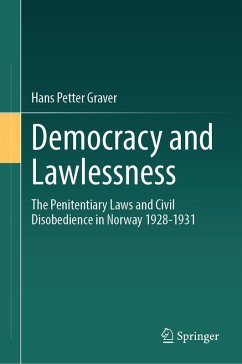In 1927 the Norwegian Parliament enacted three laws that changes the rules of the game in the relation between Labor and Capital. The law was weaponized in benefit of the employers. By this, the legislature departed from the classic ideal of equality before the law and law's autonomy as a neutral order. The new laws were called the penitentiary laws.
The demonstrations against one of the laws, the Arbitration Act in 1928 were the largest manifestation of civil disobedience in Norwegian history. They provoked a level of lawlessness that has not been matched, with exception of the situation during the German occupation 1940-1945. The book analyses the events with the aid of the theory of civil disobedience in liberal democracies put forward by the philosopher John Rawls and the theory of the legal complex developed by the socio-legal scholars Terence Halliday, Lucien Karpic, and Malcolm Feeley.
This book tells the story of the Penitentiary Laws, how the laws came into being, how they were received and resisted, and how they were defeated through civil disobedience and with the support of a legal complex which reached far into the legal system. The outcome of the conflict may be one of the factors that explain the high level of trust that the legal institutions enjoy in present day Norway.
Dieser Download kann aus rechtlichen Gründen nur mit Rechnungsadresse in A, B, BG, CY, CZ, D, DK, EW, E, FIN, F, GR, HR, H, IRL, I, LT, L, LR, M, NL, PL, P, R, S, SLO, SK ausgeliefert werden.









